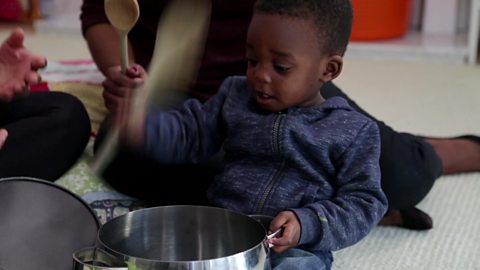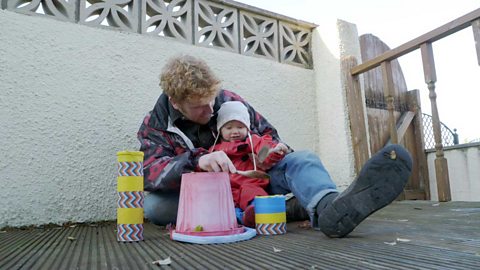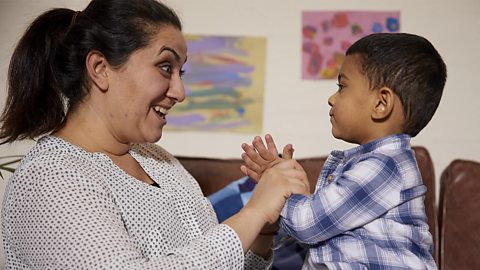When youãre singing, swaying and shimmying with your little one, you might not be thinking about all the good itãs doing you and your baby.
But everyday musical experiences are full of benefits for us all, says Music Therapist Ray Travasso. ãOur response to music is totally instinctive. And it doesnãt matter who we are, what age we are or whether we have physical or learning needs ã we all respond positively to music.ã
1. It's great for bonding
Even before theyãre born, music can help connect you and your baby. From around 15 weeks of your pregnancy, your baby starts to hear muffled sounds and voices from the outside world. And you might even find that they respond with a wiggle or kick when you sing and play music, as Tiny Happy People contributor Tania found.
The bonding potential of music continues once your baby arrives, says Ray. ãYour connection is being formed when youãre singing, when youãre ãoohingã and youãre ãahhingã. This interaction is more powerful than the song youãre singing and youãre hardwiring them to know that theyãre loved and cared for.ã
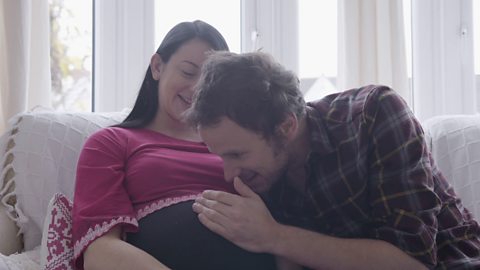
2. It helps your baby learn how to communicate
Babies are born with a natural love of music, which explains why they love watching, listening and trying to copy you when you sing songs together.
And while they do this, theyãre remembering the sound of words and honing their concentration, which is a great preparation for language learning explains specialist speech and language therapist Alys Mathers. ãWhen you sing, even little babies pick up on intonation or the patterns of talking, which is why you find them babbling with different tones ã they might sound like theyãre talking before they actually are.ã
3. It continues to help them develop their language skills as they get older
Singing songs together benefits your childãs chat in lots of different ways. ãThereãs lots of natural repetition in songs, like Old MacDonald for example ã and thatãs really good because children need to hear the same things lots and lots of times to learn them,ã explains Alys. ãYou often use actions and gestures when youãre singing, so your child learns visually, alongside spoken words. Songs also have a beat, rhythm and alliteration (when words start with the same sounds or letters), which helps them pick up on the sounds and structure of language. Your child has to listen and concentrate, and thereãs often an element of turn-taking in singing just like conversations.ã
4. It helps you stay active
ãMusic gets us moving without realising it,ã says Ray. ãBut we can also use it to power our footsteps when weãre walking and to get us dancing, which are both great forms of aerobic exercise that get our hearts and lungs working.ã So why not crank the radio up and have a boogie with your baby or a hold a dance party with your toddler?
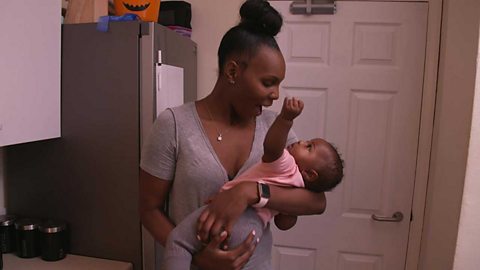
5. It can boost your childãs physical skills
Music also helps your childãs physical development in some very subtle ways. For example, action songs build their hand-eye coordination; their ability to do activities that use their hands and eyes at the same time and also their fine motor skills; the use of the smaller muscles in their hands, fingers, and wrists. Meanwhile, dancing to music is also great for their coordination and balance.
6. It can make you both feel happier ã and calmer too
When we listen to music and sing together our bodies release feel-good chemicals, explains Ray. ãSinging also helps regulate our breathing and stress levels, which mean itãs a really great way to lift a tense atmosphere at home.ã Lullabies are also scientifically proven to help babies ease into sleep by turning off certain parts of their brain, so use soothing songs as part of their daily bedtime routine.
7. It helps you build a routine
Getting musical makes routine tasks fun and adds structure to your day, says Alys. ãItãs a good idea to create a song for different parts of your childãs routine ã like a nappy change song, a tidying up song and a bathtime song. It helps them learn their routines and distracts from the fact that these tasks can be boring.ã Give your child a goal using the music, Alys explains. ãYou could say something like: ãCould you have your shoes and socks on by the time weãve finished this song?ãã.
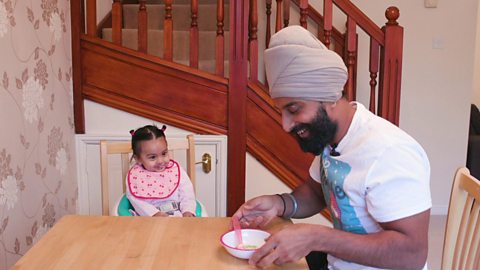
8. It can help connect you with your wider family and friends
Singing, dancing and playing music together can help build your childãs relationships with wider family and friends ã even if youãre separated by the coronavirus pandemic. Musical activities are great on video calls, explains Alys . ãFor example, itãs a great chance to try turn taking ã if you canãt sing together because the link isnãt good enough, alternate singing verses.ã
And if your family is bilingual or multilingual, sharing songs and rhymes from your culture is a fun way to bond and help your child learn.
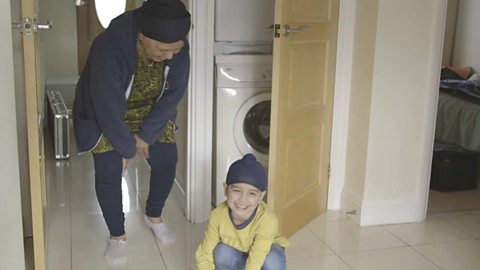
9. It can encourage your childãs creativity
Whether theyãre making up dance routines, crafting their own instruments from junk or inventing nursery rhyme lyrics, music can spark your childãs imagination. And this creativity has a ton of benefits like helping your child understand the world and gain problem solving skills.
10. You donãt have to be musical to enjoy yourself
Most of us are not musically gifted but that doesnãt matter. In fact, you donãt even need to be able to hold a tune to enjoy musical moments with your child. They love the sound of your voice, even if Simon Cowell doesnãt.
There are loads of simple and free musical opportunities at home. And there are no rules about the music you should enjoy together ãIt doesnãt need to be music in the traditional sense ã it can be raps, rhythms, or chants like ãWeãre going on a bear huntã,ã says Alys.
And if you feel self-conscious, focus on how your baby or child responds, recommends Ray. ãThis is a great way to calm the negative voice in your head. What your child is interested in is your eye contact, the fact youãre connecting and having fun, not that youãre out of tune. Just go for it!ã

